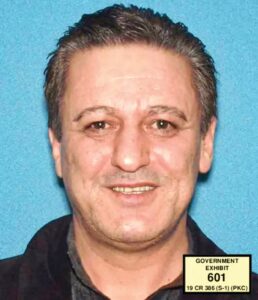Abdullah Bozkurt/Stockholm
A former Turkish Airlines employee, now a naturalized US citizen, has been convicted in New York for orchestrating cryptocurrency-based money laundering schemes on behalf of drug traffickers, exploiting Turkish networks and financial channels.
The case underscores Turkey’s emergence as a pivotal hub for money laundering operations linked to organized crime and narcotics networks, with their reach extending across the Atlantic to US soil.
Mustafa Göklü, 53, who was born and grew up in Turkey, worked for Turkish Airlines in Germany before immigrating to the United States. After his arrival, he married long-time girl friend and current Turkish Airlines employee Tuğba Gündüz Göklü, who still works in the company’s code-share department.
Göklü, who adopted the name Michael after obtaining US citizenship in 2014, founded a cryptocurrency exchange in New York under the corporate name Mustangy Corp USA. Along with running a limousine service for high-end clients and importing goods from Turkey for resale, he pursued wealth through cryptocurrency investments, offering exchange services at rates well above the commercial market to dubious actors, including drug traffickers.
Wiretap recordings reveal illegal cryptocurrency and cash transactions between Mustafa Göklü and an undercover DEA agent:
According to federal investigators, he leveraged his company to launder illicit proceeds for dozens of clients, channeling funds through both Turkish and American banks.
The case traces back to July 2018, when the US Drug Enforcement Administration (DEA) identified Göklü after he advertised on LocalBitcoins.com, offering to exchange Bitcoin for cash of up to $99,999.
An undercover agent posing as a drug trafficker responded, quickly making Göklü the target of a sting operation. Wiretap and surveillance records indicate that Göklü repeatedly met with the agent, exchanging Bitcoin for substantial cash sums, while the agent explicitly confirmed that the funds were proceeds from narcotics sales, including oxycodone and Adderall.
He charged a 7–8 percent commission on each transaction, well above standard market rates, and occasionally brought a money-counting machine to meetings to expedite the exchanges. Göklü utilized a peer-to-peer exchange network that bypassed identity verification requirements such as a driver’s license, Social Security number, date of birth, real name and proof of address unlike commercial platforms such as Coinbase
By operating in this manner, Göklü believed he was concealing his tracks and maintaining the anonymity of his clients. Unbeknownst to him, he was in fact dealing with a DEA agent, which ultimately exposed the structure of his business to federal investigators.

During certain meetings, Göklü appeared jittery, constantly looking for vehicles with tinted windows or even homeless people, fearing they might be covert police surveillance. He tried to avoid Manhattan, wary of the large network of public and private security cameras.
In one meeting, he asked how much capital would be required to personally profit from the drug trade. In another meeting, he revealed that one of his business partners had already been arrested in Manhattan after exchanging $50,000 worth of Bitcoin with a drug dealer.
Wiretapped conversations revealed that Göklü maintained substantial cash deposits in Turkey, leveraging Turkish banks to facilitate cryptocurrency exchanges abroad. He acknowledged that US banks had grown wary of his frequent transfers, compelling him to adopt evasive tactics while keeping a low profile.
By day, Göklü worked as a limousine driver, but his primary activity involved cryptocurrency exchanges, moving tens of thousands of dollars in each transaction. Court filings further revealed that he maintained corporate ties in Turkey, relied on Turkish bank accounts for documentation and had extensive family connections in both Turkey and Germany. These international links enabled him to operate across jurisdictions with relative ease.
Mustafa Göklü incorporated a company under the name Mustangy Corp USA with the New York State authorities:
In April 2019 Göklü was indicted for money laundering and operating an unlicensed money transmitting business. A New York jury convicted him in October 2022. He was sentenced in March 2024 to 16 months in prison and released on March 4, 2025, according to the Federal Bureau of Prisons.
During his hearings, Göklü maintained his innocence, denying any involvement in laundering money for drug traffickers, while his attorney argued that cryptocurrency exchanges did not require licensing under New York state law. Nevertheless, none of these defenses prevented his conviction.
During sentencing, the judge emphasized that the undercover DEA agent consistently told Göklü the funds were drug proceeds. “Certainly the jury had ample reason to find that he was willingly and knowingly laundering money and running an unlicensed transmitting business,” the judge said, noting that Göklü simply “didn’t care.”
Göklü’s case highlights how Turkey’s financial and corporate systems are routinely exploited by international criminals, including drug traffickers. Over the past decade Turkey has become a magnet for wanted fugitives, who have obtained residence and even citizenship while conducting illegal operations.
Critics argue that the Turkish government under President Recep Tayyip Erdoğan, along with its far-right ally, the Nationalist Movement Party (MHP), which maintains close ties to organized crime syndicates, has not only tolerated such activities but also shielded perpetrators from legal repercussions in exchange for bribes and financial gain.
US federal complaint filed against Mustafa Michael Göklü :












